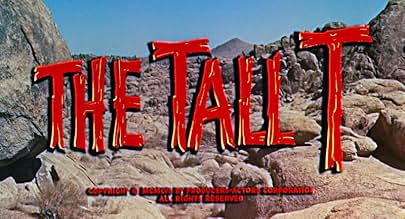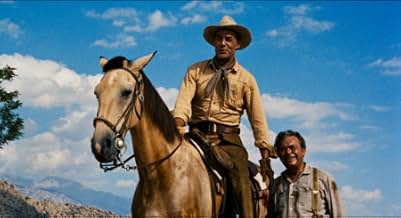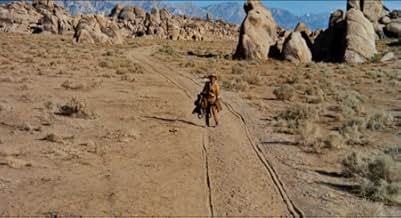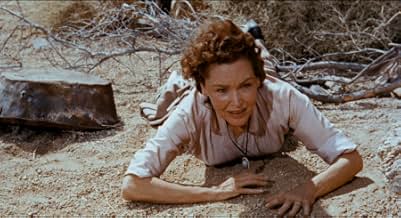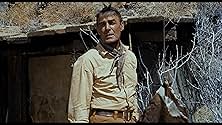AVALIAÇÃO DA IMDb
7,3/10
6,8 mil
SUA AVALIAÇÃO
Um antigo capataz de fazenda é sequestrado com uma herdeira, que está sendo mantida para resgate por um trio de foras-da-lei implacáveis.Um antigo capataz de fazenda é sequestrado com uma herdeira, que está sendo mantida para resgate por um trio de foras-da-lei implacáveis.Um antigo capataz de fazenda é sequestrado com uma herdeira, que está sendo mantida para resgate por um trio de foras-da-lei implacáveis.
- Direção
- Roteiristas
- Artistas
- Prêmios
- 1 vitória no total
Robert Anderson
- Jace
- (não creditado)
Dick Johnstone
- Townsman
- (não creditado)
Anne Kunde
- Townswoman
- (não creditado)
Christopher Olsen
- Jeff
- (não creditado)
Fred Sherman
- Hank Parker
- (não creditado)
- Direção
- Roteiristas
- Elenco e equipe completos
- Produção, bilheteria e muito mais no IMDbPro
Avaliações em destaque
There's nothing epic about this well-crafted, workman-like western, and that works in its favor. Randolph Scott is wonderful as the world-weary small-time rancher who's pursuing a better life at an age when most men in those days were either retired or dead. He meets his evil double in the guise of Richard Boone, who finds himself out of place with the heartless thugs he finds himself running with. It's his fate but he yearns for the life that Scott has chosen. Wonderful location work. Dialogue and action are used to service the story and that's all, as it should be. As fulfilling and satisfying a movie as a good serving of stew and a mug of hot coffee.
SPOILERS.
If you're attracted only to black-and-white dramas shot in the rain in Slovenia, you probably won't like this one.
It's a no-nonsense El Cheapo Western shot on a low budget, an elementary piece of exposition of masculine honor, with Boetticher, Scott, Kennedy, Richard Boone, and movie flats -- all at the top of their forms.
What distinguishes the half-dozen or so Westerns that came from Boetticher and Scott is not so much the plot, which is generally simple, but the slight twists in character and the occasional grace notes in the dialogue.
You have to love this dialogue. "Cookin'? That's WIMMIN's work!" And, said by Scott in all sincerity, "There are some things a man can't ride around." And, "There are ten head of wimmin for every man in Sonora. Course, most of them is just hurrah gals." And, "I'm not gonna get shot in the belly just 'cause you're feelin' sorry for yourself." And, "Why don't you just say it out in words?"
Basically the story has Scott and O'Sullivan (who, twenty years earlier had been Tarzan's delectable mate) held hostage by Boone and his two shallow young companions, Billy Jack (Skip Homeier) and Chink (Henry Silva). Boone, although a vicious murderer, is not entirely unsympathetic. He feels forced to "run with" these coarse companeros who live from moment to moment. They don't even know their own ages. They've been beaten and mistreated since they were kids. ("You run with them," says Scott reprovingly.) Boone, on the other hand, is sick of their talk about wimmin and such. He is lonely, has no family or wummin waiting for him. "Talk," he orders Scott at gunpoint, "about anything!" He dreams of someday having a spread of his own, with a couple of cattle, working the ground.
But the code -- I mean the movie code of the 1950s, not the Western code -- is an unforgiving one. He is, after all, a murderer. When O'Sullivan's cowardly new husband is given permission to ride off to freedom and desert his wife, Boone turns away and mutters, "Bust him, Chink." The coward's name is Willard Mimms -- Arthur Honeycutt draws out the vowel and imposes a dipthong on it when he pronounces the name -- "Mee-yums." We know Mimms is toast five seconds after we meet him.
Richard Boone is great as the heavy with the daydreams. In a particularly violent climax he is blinded by a shotgun, twirls around entangled in a burlap sheet, and collapses. Scott shows his range in this movie. He laughs at the beginning and becomes grim after being taken hostage. He even forcefully smothers O'Sullivan in passionate kisses. And I thought he only like horses and mules. Commanding too is the performance of Henry Silva, in pink shirt and suspenders. He's clever, the way a sewer rat is clever. He slouches when he walks, and he stands hipshot. His expression hardly ever varies. And his voice is matter of fact, even when he's eagerly anticipating dumping yet another body in the well.
It's quite a lot of fun, shot as it is in Movie Flats. That's Mount Whitney in the background, the highest peak in California's Sierra Nevada. The highest peak in the lower 48 for that matter.
If you're attracted only to black-and-white dramas shot in the rain in Slovenia, you probably won't like this one.
It's a no-nonsense El Cheapo Western shot on a low budget, an elementary piece of exposition of masculine honor, with Boetticher, Scott, Kennedy, Richard Boone, and movie flats -- all at the top of their forms.
What distinguishes the half-dozen or so Westerns that came from Boetticher and Scott is not so much the plot, which is generally simple, but the slight twists in character and the occasional grace notes in the dialogue.
You have to love this dialogue. "Cookin'? That's WIMMIN's work!" And, said by Scott in all sincerity, "There are some things a man can't ride around." And, "There are ten head of wimmin for every man in Sonora. Course, most of them is just hurrah gals." And, "I'm not gonna get shot in the belly just 'cause you're feelin' sorry for yourself." And, "Why don't you just say it out in words?"
Basically the story has Scott and O'Sullivan (who, twenty years earlier had been Tarzan's delectable mate) held hostage by Boone and his two shallow young companions, Billy Jack (Skip Homeier) and Chink (Henry Silva). Boone, although a vicious murderer, is not entirely unsympathetic. He feels forced to "run with" these coarse companeros who live from moment to moment. They don't even know their own ages. They've been beaten and mistreated since they were kids. ("You run with them," says Scott reprovingly.) Boone, on the other hand, is sick of their talk about wimmin and such. He is lonely, has no family or wummin waiting for him. "Talk," he orders Scott at gunpoint, "about anything!" He dreams of someday having a spread of his own, with a couple of cattle, working the ground.
But the code -- I mean the movie code of the 1950s, not the Western code -- is an unforgiving one. He is, after all, a murderer. When O'Sullivan's cowardly new husband is given permission to ride off to freedom and desert his wife, Boone turns away and mutters, "Bust him, Chink." The coward's name is Willard Mimms -- Arthur Honeycutt draws out the vowel and imposes a dipthong on it when he pronounces the name -- "Mee-yums." We know Mimms is toast five seconds after we meet him.
Richard Boone is great as the heavy with the daydreams. In a particularly violent climax he is blinded by a shotgun, twirls around entangled in a burlap sheet, and collapses. Scott shows his range in this movie. He laughs at the beginning and becomes grim after being taken hostage. He even forcefully smothers O'Sullivan in passionate kisses. And I thought he only like horses and mules. Commanding too is the performance of Henry Silva, in pink shirt and suspenders. He's clever, the way a sewer rat is clever. He slouches when he walks, and he stands hipshot. His expression hardly ever varies. And his voice is matter of fact, even when he's eagerly anticipating dumping yet another body in the well.
It's quite a lot of fun, shot as it is in Movie Flats. That's Mount Whitney in the background, the highest peak in California's Sierra Nevada. The highest peak in the lower 48 for that matter.
This is an example of a western made with not much money and very much punch. Boetticher delivers again and this is one of his best, with But Kennedy on hand to craft an excellent script.
Critics wax eloquent about Anthony Mann's use of scenery (as if he had nothing to say or do beyond that) but never mention Boetticher's use of the physical world and its geometry, but there is definitely something to speak of them in this film. The rocks and the rocks behind the rocks are beautifully used here and their iconography (an unadorned rock-solid shoot-out) work wonderfully well.
Scott is occasionally sappy during the beginning, admitted, but confronted with unspeakable crimes, never explicit or explained in full, are avenged with cool efficiency and nothing sentimental whatsoever from then on. The O'Hara-Scott relation is absolutely fascinating. This is a western for people who take westerns straight.
Curtis Stotlar
Critics wax eloquent about Anthony Mann's use of scenery (as if he had nothing to say or do beyond that) but never mention Boetticher's use of the physical world and its geometry, but there is definitely something to speak of them in this film. The rocks and the rocks behind the rocks are beautifully used here and their iconography (an unadorned rock-solid shoot-out) work wonderfully well.
Scott is occasionally sappy during the beginning, admitted, but confronted with unspeakable crimes, never explicit or explained in full, are avenged with cool efficiency and nothing sentimental whatsoever from then on. The O'Hara-Scott relation is absolutely fascinating. This is a western for people who take westerns straight.
Curtis Stotlar
10lwetzel
**** I never really figured out what the Tall T exactly was. It doesn't matter. This is a great film and an outstanding western. The actors are all good, especially Randolph Scott as a western everyman (I always want to repeat the "Blazing Saddles" homage to Scott whenever I say his name)and Richard Boone as one of the most evil bad men in western film history. Skip Homeier and Henry Silva give great performances as two young guns who are teamed up with Boone. They are sexy and evil at once. The dialogue is biting, the situations are adult and dramatic, the scenery is superb, and the music complements the film's tension to a Tall T.
This 1957 Western follows in the tradition of "Rawhide" (1951). Once again we find a group of people that are being held by a band of thieves while waiting for their next stage to rob. This time Randolph Scott has taken over the Tyrone Power role of the hero in the earlier film. Scott must wait for the appropriate opportunity to make his stand against the evil band of killers (Richard Boone, Skip Homeier, and Henry Silva). Maureen O'Sullivan (who once portrayed Tarzan's Jane of the movies) finds herself in the unusual role of portraying a "plain jane" who has recently married a scoundrel. The newlyweds are on their way to their honeymoon when they are captured by Boone and his gang of cut throats. O'Sullivan's husband tries to use his new wife and her father's fortune as a bargaining chip to buy his way out of his predicament...but the killers wind up killing him along with the stage station's owner and his son. The hapless victims all seem to be killed off one by one and thrown into a well. Margaret O'Sullivan's only hope is for Randy to somehow save her. Scott uses the gang's individual weaknesses to get the drop on them .... and what is to come is one of the most brutal Westerns made during that period of film making. This film serves as a transitional bridge between the old Ken Maynard (man in a white hat who only drinks milk) bloodless Western and the grimy, realistic sweat stained Spaghetti Western that is destined to come. A fine cast and a disciplined script makes it everything one could hope for in a Western!!!
Você sabia?
- CuriosidadesAlthough playing the older man, Arthur Hunnicutt was in reality twelve years younger than Randolph Scott.
- Erros de gravaçãoAs Brennan rides into town, after the meeting with the station keeper and his son, he passes the stage, which is standing in the street. Behind the stage, in the street behind, there is a parked car.
- Citações
[last lines]
[Pat, to the weeping Doretta, after he has killed three murderous kidnappers]
Pat Brennan: Come on now. It's gonna be a nice day.
Principais escolhas
Faça login para avaliar e ver a lista de recomendações personalizadas
- How long is The Tall T?Fornecido pela Alexa
Detalhes
- Data de lançamento
- País de origem
- Idioma
- Também conhecido como
- O Resgate do Bandoleiro
- Locações de filme
- Empresas de produção
- Consulte mais créditos da empresa na IMDbPro
- Tempo de duração
- 1 h 18 min(78 min)
Contribua para esta página
Sugerir uma alteração ou adicionar conteúdo ausente


